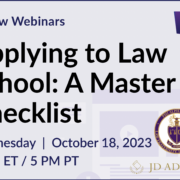Should I go to law school if I do not want to practice law?
 “Should I go to law school?” is a difficult (and highly-debated) question as it is. With the dismal job market and an astronomical amount of debt that law students are in, most people think law school is simply a bad choice.
“Should I go to law school?” is a difficult (and highly-debated) question as it is. With the dismal job market and an astronomical amount of debt that law students are in, most people think law school is simply a bad choice.
So the question “Should I go to law school if I do not want to practice law?” is often met with a resounding “no!!” This question is asked by only a small percentage of the population (I was part of that small percentage) and that small percentage will have to defend their decision tooth-and-nail if they truly do not plan on practicing law after law school. As someone who had no intent to practice law, I had to defend my decision all throughout law school and even now as someone who does not practice law full time.
So, should you go? This black-and-white question does not have a black-and-white answer. Instead, it is something that should be carefully thought out. For those considering going to law school with no desire to practice law, here are some questions to ask beforehand:
- How much debt will you be in when you get out? This is a huge, important question and can be a deal-breaker. A lot of debt will stress you out, weigh you down, and can enslave you into accepting or keeping a job you do not like. When you are considering debt, consider not only the cost of law school, law books, etc., but also consider the cost of living wherever you are attending school. Remember that you will likely not be working (or at least you will most likely not be working much). Thus, the financial burden cannot be overstated. Also remember that if you are not planning on practicing law, you will not necessarily be able to pay off debt as fast as your classmates who get high-paying lawyer jobs.
Looking for some ways to reduce debt? A few ideas: First, apply for as many scholarships as possible. Many are based on financial need. Second, consider attending law school part-time and working part-time if possible. Last, consider attending an in-state law school. If your heart is set on an out-of-state school, see if it is possible to establish residency in that state the year before you plan on applying to lower the tuition.
- Do you really like school – and do you have time for it? Most students who are seriously considering applying to law school without the intent to practice law really like to be challenged intellectually so usually that is not an issue. The issue becomes: Do you have time for it? Law school is not like undergrad. It is highly intellectually challenging and leaves little time for other obligations. If you have other substantial obligations (a family, a job you cannot leave) then contemplate whether you will have the time and mental energy that you will need to attend law school. Discuss your decision with family members and friends and weigh your options carefully.
- What do you want to do when you are done with law school? Will a law degree help you? It is useful to have a law degree for some careers (such as those in the fields of human resources, business, politics, alternative dispute resolution, government jobs, etc). Are you considering one of those fields? If so, is there anything stopping you from applying to one of those fields without obtaining a law degree? Does a law degree add something invaluable to the field?
- Why do you want to go to law school? Does the intellectual challenge appeal to you? Do you think it will help you grow as a person? Or are you just delaying facing reality, becoming independent, and getting a job? Take some time for introspection to figure out your true motives for applying to law school.
These questions may not have easy answers but it is well worth it to spend some time to make a mature, well-thought-out decision. In truth, the deck is stacked against you if you do not plan on practicing law after law school – but that doesn’t necessarily mean you shouldn’t go.
It also doesn’t mean that you won’t end up practicing law (despite yourself!) I went to law school determined to end up in mediation or human resources. However, I ended up practicing law and working in litigation for about three years. Remember that in this day and age, it is much less common to have one job after you graduate. It is a lot more common to switch jobs, and even switch fields. So practicing law (even for a little while) is not something you have to wipe off the table completely.
Pursuing Law School? We’ve Got You Covered!
🌟 Special Offer: Enroll in our FREE on-demand law school prep course, meticulously crafted by a top-ranked law student. Secure your spot now





